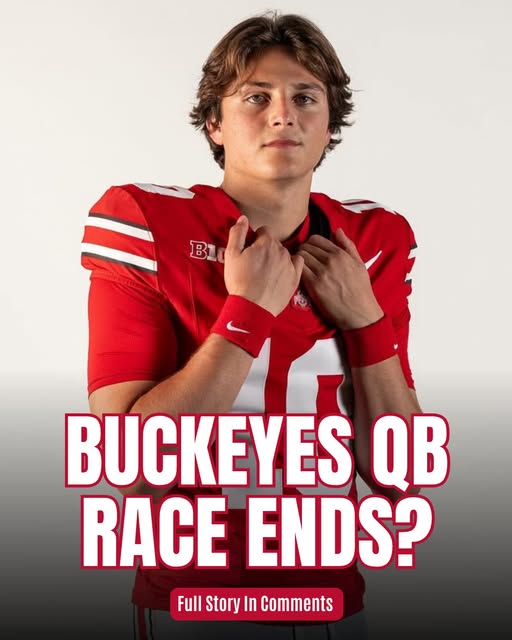A Notre Dame Football Custom That Is Unmatched
Tradition breathes life into college football, weaving a tapestry of history, pride, and pageantry that transcends the game itself. Among the sport’s most storied institutions, the University of Notre Dame stands tall, its rich history echoing through generations of players, students, and fans. But within its vast vault of tradition, one custom stands out — a simple act that encapsulates the program’s spirit, unity, and relentless pursuit of excellence. Before each home game, as the Fighting Irish charge through the tunnel of Notre Dame Stadium, every player reaches up to tap the bold, gold-lettered sign that reads: Play Like a Champion Today. That small gesture, performed with unwavering consistency since the late 1980s, has become an unmatched symbol of purpose, grit, and sacred ritual in college football.
To understand the weight of this tradition, one must appreciate its subtle power. Unlike the pyrotechnics or choreographed entrances of other programs, Notre Dame’s pre-game routine is grounded in quiet resolve. There’s no elaborate fanfare — just a staircase descending from the locker room, a low-hanging sign, and the sound of cleats clicking with anticipation. The players, already dressed in gold helmets polished to a mirror shine, reach up with hands that have gripped countless hours of training. They don’t shout. They don’t stop. They tap the sign — some lightly, some with force — and keep moving. That moment, captured in countless photographs and memory reels, is the embodiment of a sacred promise. It’s a moment of focus, of commitment, of honoring all those who came before.
The origins of the phrase trace back to Coach Lou Holtz, who resurrected it in 1986 after reading the quote in a book. Inspired by its message, he commissioned the now-iconic sign to be placed above the narrow staircase leading from the locker room to the tunnel. Holtz believed in the psychology of preparation, the power of the mind to sharpen a player’s instincts and attitude. For him, the sign was more than motivational — it was a challenge, a mental reset. It reminded each player that wearing the Notre Dame jersey meant playing for something larger than self. Since that day, no Fighting Irish team has taken the field at home without first touching that sign. It became ritual. It became law.
What makes the custom unmatched is not just its longevity, but its soul. Other teams have signs, slogans, or chants. Clemson rubs Howard’s Rock. Florida State has Chief Osceola and the spear. Oklahoma storms in with the Sooner Schooner. But Notre Dame’s gesture is different — minimalist, almost monk-like. It represents internal transformation rather than external spectacle. It is an intimate moment between the athlete and the ethos of the program. The sign doesn’t cheer. It doesn’t move. It demands. “Play Like a Champion Today” isn’t merely a suggestion; it’s a directive, a moral imperative etched into the subconscious of every player who passes beneath it.
What’s even more profound is how the sign has taken on layered meanings over time. For some, it’s a reminder of personal excellence — to give 100 percent effort, to execute each play with precision. For others, it’s about teamwork — to support one another, to fight not just for personal glory, but for the brothers beside you. And for many, it symbolizes tradition and accountability. When they tap that sign, they are also tapping into the spirits of Notre Dame legends like Knute Rockne, George Gipp, Paul Hornung, Joe Montana, Tim Brown, and Brady Quinn. They are acknowledging the sacred history of a program that dates back to 1887 — a program that has withstood wars, controversies, and the evolution of modern sport.
There’s a certain reverence to the way the tradition is preserved. Unlike other pre-game rituals that have changed or faded with coaching staff, branding efforts, or player turnover, Notre Dame’s sign remains constant. It hasn’t been updated to look flashy or digital. It hasn’t been rebranded for marketing purposes. It’s the same humble, wooden board with gold lettering on a blue background — unpretentious and timeless. This resistance to change in an era obsessed with reinvention is part of what makes the tradition so powerful. It doesn’t seek to impress. It commands respect.
Former players often speak of the sign with deep emotion. It’s not uncommon for alumni, long after graduation, to return to the locker room, touch the sign once more, and feel a rush of memories — wins and losses, injuries and triumphs, the camaraderie of shared purpose. For them, the sign isn’t just a game-day ritual; it’s a portal to a defining chapter of their lives. Even fans who have never suited up for Notre Dame talk about the sign with reverence. It appears on T-shirts, posters, and even tombstones. Parents who bring their children to South Bend for campus visits often seek out the sign, hoping their kids will grasp even a fraction of its significance.
The phrase itself — “Play Like a Champion Today” — carries universal wisdom. It doesn’t say “Win” or “Dominate.” It says Play. Play the game. Compete. Strive. And do so like a champion — with character, heart, preparation, and intensity. The sign is not a guarantee of victory; it’s a call to integrity. That’s a distinction worth appreciating, especially in a sports culture increasingly fixated on results over values. Notre Dame’s sign teaches that greatness isn’t defined solely by the scoreboard. It’s defined by effort, poise, and the way you carry yourself when the stakes are highest.
Opponents who visit Notre Dame Stadium often comment on the atmosphere — the respectful crowd, the serene campus, the spiritual undertones. But no moment captures Notre Dame’s mystique quite like that pre-game walk from the locker room. As the players descend the stairs, hearts pounding, adrenaline rising, the final act before entering the field is not a cheer or a roar — it’s a touch. A hand to wood. A reminder to channel greatness. The sign doesn’t say “Score More.” It says “Play Like a Champion.” And so they do.
Of course, like all traditions, this one has endured scrutiny. Some have argued that the phrase is overused, that its impact is dulled by commercial replication. But in the hearts of those who’ve lived it, the message has never dimmed. It doesn’t matter if it’s plastered on a thousand mugs and mousepads. On game day, in the quiet moments before combat, that sign remains sacred. It is shielded by sincerity. The ritual has survived eras of dominance and rebuilding alike, because it is rooted not in image, but in identity.
The custom has also inspired other programs, even beyond football. Across college campuses, coaches in various sports have adopted similar motivational slogans for their locker rooms. But imitation cannot replicate meaning. Notre Dame’s tradition is steeped in its unique culture — a blend of faith, discipline, legacy, and academic rigor. The sign only works because it reflects the school’s entire philosophy. The same phrase wouldn’t resonate the same way anywhere else. It is uniquely Notre Dame.
What separates this ritual from others in college football is its accessibility. Fans can’t ride the Sooner Schooner. They don’t throw down spears or jump into lakes. But anyone — a walk-on, a scholarship player, a freshman seeing the field for the first time — can reach up and tap that sign. It levels the hierarchy. It says, “You’re one of us now. Act like it.” It becomes the final step before transformation — from student to competitor, from hopeful to hero.
As Notre Dame football continues into the future — through coaching changes, playoff expansions, and evolving media landscapes — one thing remains certain: the sign will stay. It will be there for the next generation of Irish players who descend that stairwell in South Bend, hungry to prove themselves. And whether they win or lose on the field, they’ll walk away having answered a question not just about football, but about life: Did I play like a champion today?
That is the unmatched beauty of this tradition. It is not loud. It is not flashy. But it is enduring. It is humbling. It is sacred. In a world that often forgets what matters, Notre Dame’s players are reminded — every home game, every step, every tap — of who they are, and what they’re called to be



